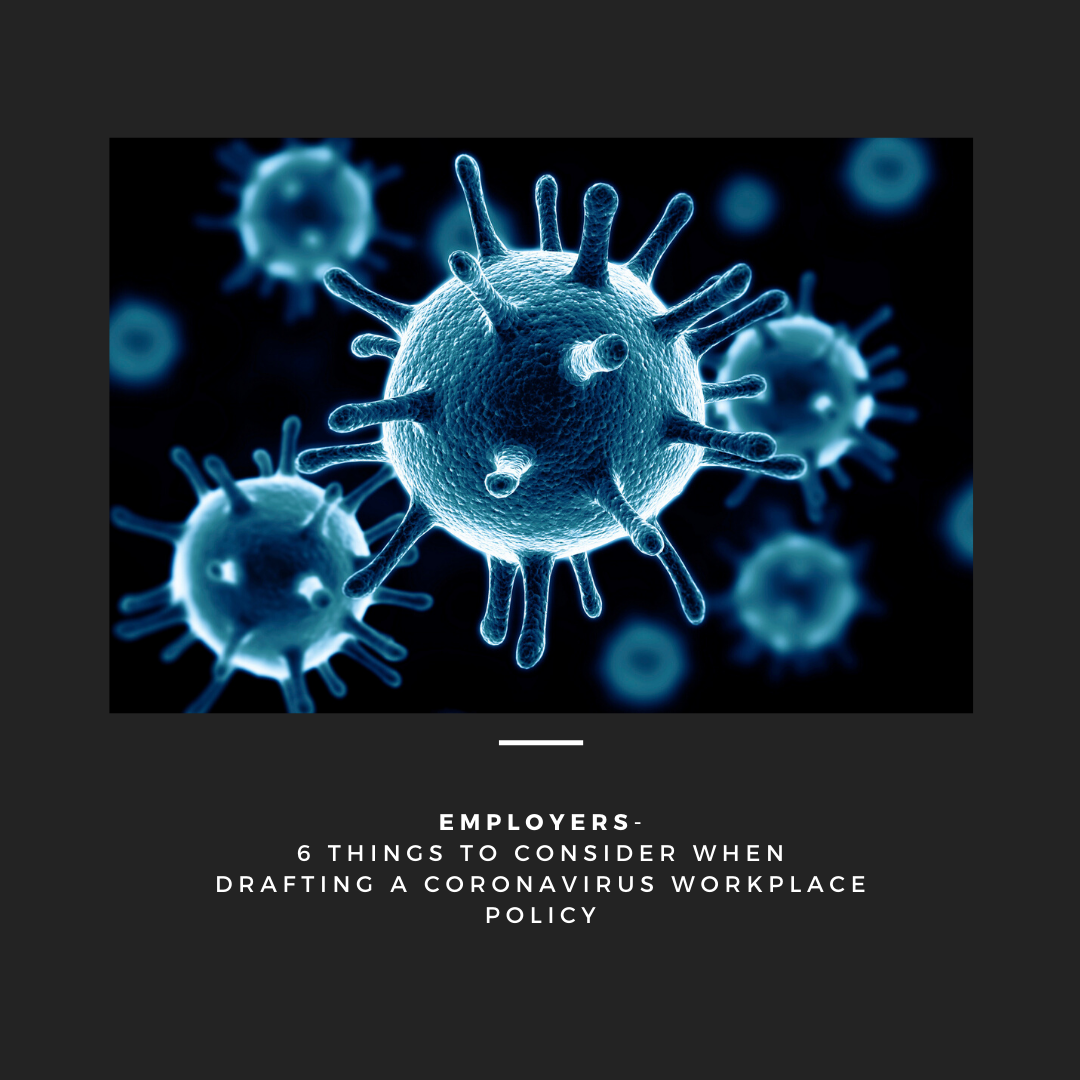|
As of March 9, 2020, the COVID-19 or Coronavirus has infected at least 600 known people in the US and killed 26. Bay area tech giants such as Facebook, Google, and Apple have implemented work from home policies to prevent the further spread of the disease. Work from home policies are great for businesses that can operate remotely, but what is required of business that can’t? Below are 6 things you need to consider when implementing a Coronavirus Workplace Policy if blanket work from home policies aren’t right for your business.
1.Repeatedly emphasize good hygiene. As with the seasonal flu, prevention is key. The CDC recommends hand washing with soap and water for at least 20 seconds or the use of alcohol-based hand sanitizer, . Employers should ensure there are adequate hand washing stations stocked with soap and paper towels and hand sanitizer available to their workforce. Consider posting signs in bathrooms to remind workers to wash their hands regularly. Remind workers to shield coughs and sneezes with their elbows, tissues, or shoulders and not their hands. Encourage the “ebola elbow bump” in lieu of handshakes and hugs and discourage employees from touching their eyes, nose, and mouth with unwashed hands. 2.Encourage workers who don’t feel well to stay home. Send symptomatic employees home. If a worker is displaying respiratory symptoms such as coughing, sneezing or shortness of breadth and/or has a temperature, they should be instructed to stay home. If one develops such symptoms in the workplace, they should immediately be separated from other workers, sent home, and encouraged to seek medical assistance. Employers should not require a doctor’s note from sick employees as healthcare providers may be facing a surge of new patients in the face of a widespread outbreak. Symptomatic employees should not return to the workplace for a minimum of 72 hours after a fever has resolved and symptoms have resolved 3.Ensure compliance with State and local sick leave rules. As workers become ill or are otherwise sent home due to concerns about exposure, employers should anticipate workplace absences. It is critical that employers maintain sick leave policies are flexible and consistent with public health guidance. At a minimum, the policies should comply with all state and local sick leave policy rules. California requires employers to provide at least one hour of paid sick leave for every 30 hours each employee works up to a maximum of 48 hours accrued paid sick leave. Alternatively, employers may provide 24 hours of paid sick leave to each employee at the beginning of each calendar year or by the 120th calendar day of his or her employment. There are other rules regarding limitations on use, carry over of unused paid sick leave, and specific local rules that might apply. Seek advice of counsel to ensure your policies are compliant with sick leave rules to avoid potential employment claims. 4.Identify and isolate suspected cases. At the moment, the risk of exposure in most workplaces is very low though the situation is changing rapidly. Nevertheless, OSHA recommends that people suspected of having coronavirus in the workplace should be immediately isolated from the rest of the workforce. The employer should take steps to limit spread of the disease such as offering a face mask if tolerated. Note that the use of face masks is not recommended for healthy individuals. 5.Preserve confidentiality when dealing with confirmed cases. Employers should instruct their workers to advise them if they have come into contact with or are caring for a family member with a confirmed coronavirus case. If an employee has or has been exposed to a confirmed case of coronavirus, employers should take steps to inform fellow employees of the possible exposure but take caution not to disclose the identity of the confirmed case. Failure to protect confidentiality under the circumstances is a violation of the ADA (Americans with Disabilities Act). 6.Increase environmental cleaning frequency. Employers should routinely clean all frequently touched surfaces of the workplace. If an employee is confirmed to have coronavirus, employers should carefully evaluate whether or not to conduct decontamination efforts. As an additional protective measure, employers should provide disposable sanitizing wipes to for workers to wipe down surfaces before each use. Smith Shapourian Mignano PC is available to answer any questions or concerns you may have regarding a workplace policies. This blog does not constitute solicitation or provision of legal advice, and does not establish an attorney-client relationship. This blog should not be used as a substitute for obtaining legal advice from an attorney licensed or authorized to practice in your jurisdiction. You should always consult a suitably qualified attorney regarding any specific legal problem or matter in a timely manner, as statutes of limitations may bar your claim. Comments are closed.
|
Archives
February 2023
Categories
All
|
© 2023 SSM Law PC. All Rights Reserved.
Privacy Policy
Terms of Use
Accessibility Statement
Attorney Advertising
Client Reviews & Testimonials

 RSS Feed
RSS Feed